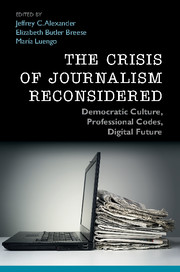Book contents
- Frontmatter
- Dedication
- Contents
- About the Contributors
- Preface
- Acknowledgments
- Introduction: Journalism, democratic culture, and creative reconstruction
- PART I THE CRISIS NARRATIVE
- 1 The perpetual crisis of journalism: Cable and digital revolutions
- 2 The crisis of public service broadcasting reconsidered: Commercialization and digitalization in Scandinavia
- 3 Beyond administrative journalism: Civic skepticism and the crisis in journalism
- 4 The many crises of Western journalism: A comparative analysis of economic crises, professional crises, and crises of confidence
- 5 The crisis in news: Can you whistle a happy tune?
- PART II FEARS OF DIGITAL NEWS MEDIA: THE SYMBOLIC STRUGGLE
- PART III PROFESSIONAL JOURNALISM, CIVIL CODES, AND DIGITAL CULTURE
- Conclusion: News innovations and enduring commitments
- Index
5 - The crisis in news: Can you whistle a happy tune?
from PART I - THE CRISIS NARRATIVE
Published online by Cambridge University Press: 05 June 2016
- Frontmatter
- Dedication
- Contents
- About the Contributors
- Preface
- Acknowledgments
- Introduction: Journalism, democratic culture, and creative reconstruction
- PART I THE CRISIS NARRATIVE
- 1 The perpetual crisis of journalism: Cable and digital revolutions
- 2 The crisis of public service broadcasting reconsidered: Commercialization and digitalization in Scandinavia
- 3 Beyond administrative journalism: Civic skepticism and the crisis in journalism
- 4 The many crises of Western journalism: A comparative analysis of economic crises, professional crises, and crises of confidence
- 5 The crisis in news: Can you whistle a happy tune?
- PART II FEARS OF DIGITAL NEWS MEDIA: THE SYMBOLIC STRUGGLE
- PART III PROFESSIONAL JOURNALISM, CIVIL CODES, AND DIGITAL CULTURE
- Conclusion: News innovations and enduring commitments
- Index
Summary
The first newspaper in the world was published in Strasbourg in 1605 if we mean by “newspaper” a vehicle for organized newsgathering published on paper in a recurrent, periodical form for a general audience. The newspaper, then, first appeared in what historians of Europe call the “early modern” era. Like other elements of modernity that date to the 1600s and early 1700s – like the controlled experiment or the novel – it is a cultural form that we have come to take for granted as constitutive of our world. The controlled experiment remains a vital part of liberal societies to this day. Even the novel, whose death has been regularly announced for generations, continues its spirited life.
And newspapers? As I write this, the argument is strong that we are in the endgame of the distribution of news on paper. It was renewed in 2014 by the late David Carr, the savvy media reporter for The New York Times, who died unexpectedly in February, 2015. Carr noted that in the space of a week in August, 2014, three major US news companies – Gannett, Tribune Company, and E. W. Scripps – spun off their newspaper properties from their multi-media empires. The flurry of divestitures, he wrote, looked like “one of those movies about global warming where icebergs calve huge chunks into churning waters.” Carr reported discouraging numbers but even more alarming were his metaphors. He compared divesting the newspaper properties after a decade of stripping them of their resources to “trashing a house by burning all the furniture to stay warm and then inviting people in to see if they want to buy the joint.” And while he blamed “the natural order” of the marketplace, he found no solace or hope in the public. Many people, he wrote, “haven't cared or noticed as their hometown newspapers have reduced staffing, days of circulation, delivery and coverage.” Are they likely to notice or care “when those newspapers go away altogether? I'm not optimistic about that.”
- Type
- Chapter
- Information
- The Crisis of Journalism ReconsideredDemocratic Culture, Professional Codes, Digital Future, pp. 98 - 116Publisher: Cambridge University PressPrint publication year: 2016
- 3
- Cited by

